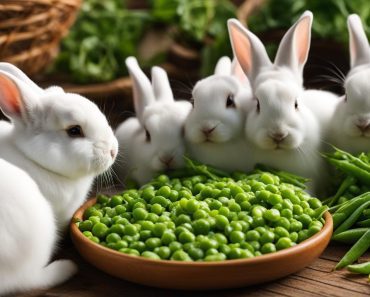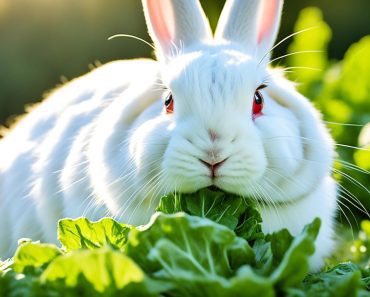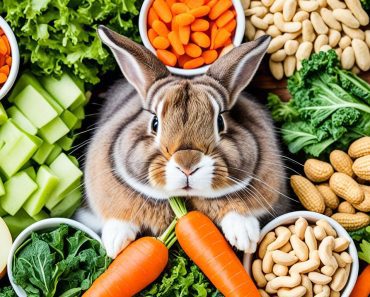When it comes to a rabbit’s diet, it’s important to provide them with a variety of healthy foods. One question that often arises is whether rabbits can eat spinach leaves. As a rabbit owner and enthusiast, I have researched and gathered some valuable feeding tips regarding spinach for rabbits.
Spinach can indeed be included in a rabbit’s diet, but in moderation. It is packed with fiber, minerals like potassium and iron, and vitamins, especially Vitamin A. However, spinach also contains oxalates, which can cause urinary tract issues and itchiness if consumed in large portions. It’s important to introduce spinach slowly and in small amounts to avoid gastrointestinal problems.
The amount of spinach a rabbit can eat depends on its size. Smaller rabbits may not be able to handle as much spinach as larger ones. It’s best to rotate the greens in a rabbit’s diet and mix them with other vegetables to ensure a balanced nutritional intake.
Can Rabbits Eat Spinach Leaves? Yes, they can, as an occasional snack.
- Spinach can be included in a rabbit’s diet, but in moderation.
- Introduce spinach slowly and in small amounts to avoid gastrointestinal issues.
- Rotate the greens in a rabbit’s diet and mix them with other vegetables.
- Smaller rabbits may not be able to handle as much spinach as larger ones.
- Consult with a veterinarian for more specific dietary guidelines for your rabbit.
Is Spinach Safe for Rabbits to Eat?
When it comes to a rabbit’s diet, it’s important to consider the safety and health benefits of the food they consume. Spinach, a nutritious leafy vegetable, can be a part of a rabbit’s diet, but it should be fed in moderation.
Spinach is packed with fiber, making it beneficial for a rabbit’s digestive system. It also contains essential vitamins and minerals that contribute to their overall well-being, including Vitamin A, Vitamin B9, Vitamin K1, iron, calcium, and magnesium.
However, it’s crucial to be aware that spinach also contains oxalates, which can be harmful if consumed in excessive amounts. To ensure the safety of your rabbit, it’s best to introduce spinach gradually and monitor their response. If you notice any adverse reactions, such as gastrointestinal issues or discomfort, it’s important to limit or avoid feeding them spinach.
When serving spinach to your rabbit, it should always be fresh and raw. Cooked or frozen spinach can lead to digestive issues. Additionally, it’s recommended to wash the spinach thoroughly before feeding it to remove any residues of pesticides or herbicides. Organic spinach varieties can be a safer choice to minimize the exposure to harmful chemicals.
Safe Vegetables for Rabbits
While spinach can be safe for rabbits when fed appropriately, it’s essential to provide a balanced diet with a variety of vegetables. Some other safe vegetables for rabbits include:
- Carrots
- Bell peppers
- Broccoli
- Romaine lettuce
- Cilantro
- Kale
Introducing these vegetables along with spinach can ensure that your rabbit receives a diverse and nutritious diet.
Remember, each rabbit is unique, and their dietary needs may vary. If you have any concerns or questions regarding your rabbit’s diet, it’s always best to consult with a veterinarian specialized in small animal care.
How to Feed Rabbits Spinach
When it comes to including spinach in a rabbit’s diet, there are a few important considerations to keep in mind. By following these tips, you can ensure that your furry friend enjoys the benefits of spinach while maintaining a healthy and balanced diet.
Choose Organic Spinach
When selecting spinach for your rabbit, opt for organic varieties to avoid pesticides and other potentially harmful chemicals. This will help ensure that your rabbit receives the safest and healthiest option.
Wash Thoroughly
Prior to feeding spinach to your rabbit, be sure to wash it thoroughly to remove any dirt or residue. This will help eliminate any potential contaminants that may be present on the leaves.
Offer Various Types of Spinach
While baby spinach is a popular choice, rabbits can also eat larger leaves and stems. Including different types of spinach in their diet adds variety and provides a range of nutrients.
Stick to Raw Spinach
Rabbits have a unique digestive system that is best suited to raw foods. Therefore, it’s important to feed them only raw spinach and avoid cooked or frozen spinach, which can be difficult for them to digest properly.
Remove the Roots
Although the leaves and stems of spinach are beneficial for rabbits, the roots should be removed. Spinach roots contain high amounts of sugar and offer limited health benefits, so it’s best to exclude them from your rabbit’s diet.
Moderation is Key
While spinach can be a healthy addition to a rabbit’s diet, it should be fed in moderation. Incorporate it gradually, starting with small amounts, and monitor your rabbit for any adverse reactions or digestive issues.
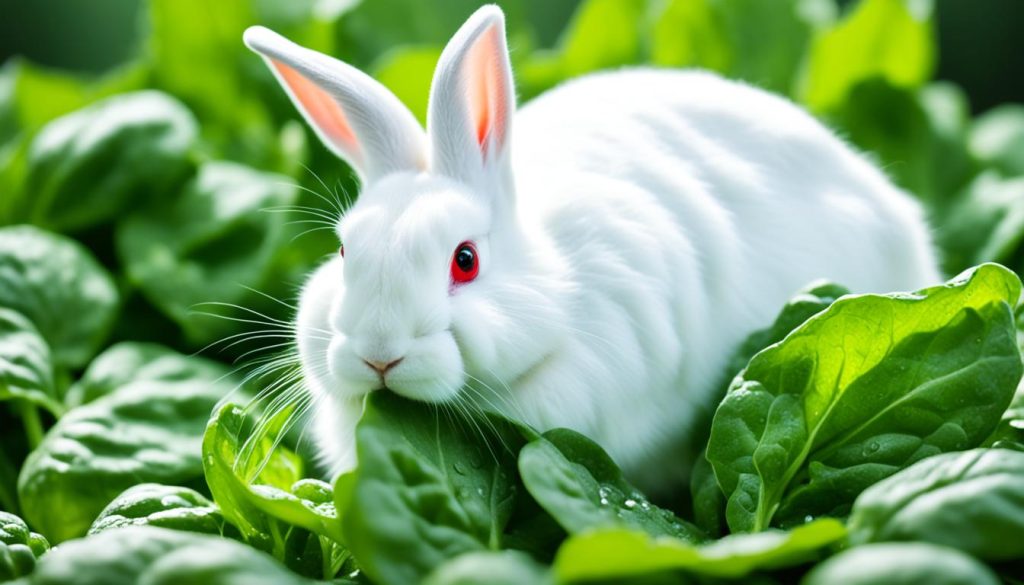
By following these feeding tips, you can safely introduce spinach into your rabbit’s diet and provide them with a range of nutrients. Remember to consult with a veterinarian about your rabbit’s specific dietary needs and always prioritize their well-being.
Health Benefits of Spinach for Rabbits
Spinach offers several health benefits for rabbits, making it a valuable addition to their diet. Here are some of the key reasons why spinach is good for rabbits:
- Fiber-rich: Spinach is high in fiber, which aids in digestion and promotes regular and healthy bowel movements for rabbits.
- Essential vitamins: Spinach contains important vitamins that support overall health. Vitamin A found in spinach helps in maintaining healthy teeth, bones, and skin. Vitamin B9, also known as folate, plays a crucial role in fighting heart disease and promoting overall heart health in rabbits.
- Natural anticoagulant: The Vitamin K1 present in spinach acts as a natural anticoagulant, helping to prevent blood clotting, which is beneficial for rabbits.
- Vital minerals: Spinach contains minerals like iron, calcium, and magnesium, which are essential for various bodily functions in rabbits, such as oxygen transportation, bone strength, and muscle function.
How Much Spinach Should I Feed My Rabbit?
The amount of spinach a rabbit can eat depends on its body weight. When it comes to including spinach in a rabbit’s diet, it’s important to consider their size and the recommended guidelines provided by the RSPCA.
Smaller rabbits may not be able to handle any amount of spinach, as their digestive systems may be more sensitive. On the other hand, larger rabbits can enjoy a small handful of spinach leaves once every few days, but it’s crucial not to exceed twice a week.
Remember, spinach should be just one component of a rabbit’s diet. It’s essential to offer a variety of vegetables and rotate the greens each week to ensure a balanced and nutritious feeding regimen.
Feeding a rabbit too much spinach, like any other food, can lead to digestive issues. Therefore, it’s always best to introduce new foods gradually and monitor your rabbit’s response to ensure their health and well-being.
Cooked vs. Raw Spinach
When it comes to feeding rabbits, it’s important to consider whether spinach should be served cooked or raw. Rabbits should only be fed raw spinach, as their digestive systems are not equipped to handle cooked or frozen food. Raw spinach contains essential fiber content, which is crucial for their proper digestion and overall health.
Raw spinach is rich in vitamins and minerals that are beneficial to a rabbit’s nutrition. It provides them with essential nutrients like Vitamin A, which supports their teeth, bones, and skin health, as well as other important vitamins and minerals.
Before feeding raw spinach to rabbits, it’s crucial to wash it thoroughly. This helps to remove any traces of pesticides or herbicides that may be present on the leaves. By ensuring the cleanliness of the spinach, you can provide a safe and healthy diet for your rabbits.
Are Rabbits Allowed Spinach Leaves, Stalks, and Roots?
Rabbits can eat spinach leaves, stalks, and stems. In fact, the stalks and stems of spinach have greater fiber content than the leaves, making them a beneficial part of a rabbit’s diet. However, the roots of spinach should not be fed to rabbits, as they are high in sugar and counteract the health benefits of the vegetable. It’s important to provide rabbits with a variety of vegetables, including spinach, to ensure a well-rounded and nutritious diet.
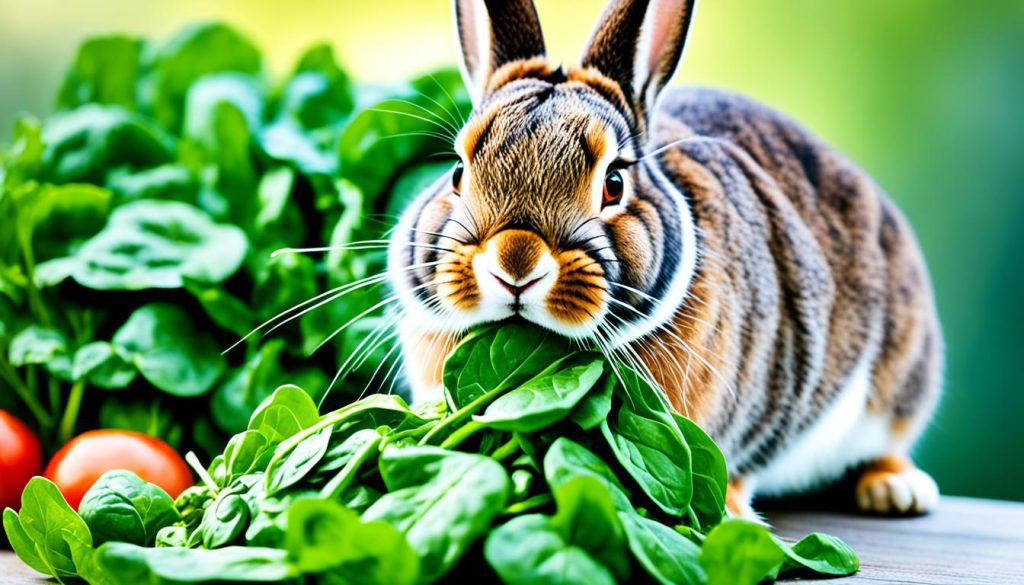
When feeding spinach to rabbits, it’s crucial to remember that moderation is key. While spinach has numerous health benefits, it also contains oxalates which can cause issues when consumed excessively. By including spinach leaves, stalks, and stems in a rabbit’s diet, you’re providing them with essential nutrients such as fiber, vitamins, and minerals. Just make sure to avoid feeding them the roots, which are high in sugar and may be detrimental to their overall health.
Including spinach as part of your rabbit’s diet can contribute to their overall well-being. Along with a varied selection of other vegetables, spinach adds nutritional value and promotes a balanced diet for your furry friend. Remember to consult with a veterinarian and monitor your rabbit’s reaction to spinach to ensure it suits their individual dietary needs.
Conclusion
Can rabbits eat spinach leaves? Yes, they can, but in moderation. Spinach offers several health benefits for rabbits, including high fiber content, essential vitamins like Vitamin A and Vitamin B9, and important minerals such as iron, calcium, and magnesium. However, it’s crucial to introduce spinach slowly into a rabbit’s diet, serve it raw, and monitor for any adverse reactions. It’s also important to consider the rabbit’s size and body weight when determining the appropriate amount of spinach to feed.
To ensure a balanced and nutritious rabbit diet, it’s best to rotate the greens and mix them with other vegetables. Remember to wash the spinach thoroughly before feeding it to remove any traces of pesticides or herbicides. While spinach can be a healthy addition to a rabbit’s diet, it’s always recommended to consult with a veterinarian if you have any concerns or questions about your rabbit’s nutritional needs.
So, when it comes to feeding your rabbit, remember to offer spinach as part of a varied diet, but in moderation. With proper care and attention to their dietary needs, you can keep your rabbit happy and healthy for years to come.

